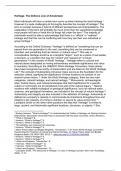Heritage- The Defence Line of Amsterdam
Most individuals will have a certain term come up when hearing the word heritage.1
However it is quite challenging to thoroughly describe the concept of heritage.2 The
term is complex because it has lot of different perspectives and interpretations. The
explanation of the term will probably be much more than the superficial knowledge
most people will have of what kind of things fall under the term.3 The majority of
individuals would be able to acknowledge that there is a “official” or “national”
heritage and that this can be conflicting with how they see their own individual or
group heritage.4
According to the Oxford Dictionary "heritage" is defined as "something that can be
passed from one generation to the next, something that can be conserved or
inherited, and something that has historic or cultural value."5 One way to
conceptualize heritage would be as a tangible "object," such as a piece of real estate,
a structure, or a location that may be "owned" and "passed on" to future
generations.6 In the context of World “heritage”, “heritage refers to cultural and
natural places designated as having extraordinary worldwide significance and value
to humanity.7According to the UNESCO World Heritage Convention, these places
have been recognized as worthy of preservation and are listed on the World Heritage
List.8 The concept of Outstanding Universal Value serves as the foundation for the
selection criteria, signifying the significance of these locations as symbols of our
shared human history. 9 Under the World Heritage category, there are two main
categories, cultural heritage, and natural heritage. 10 Monuments, archaeological
sites, historic towns, and cultural landscapes that hold significance for a specific
culture or community are all considered to be part of the cultural legacy.11 Natural
locations with notable ecological or geological significance, such as national parks,
reserves, and geological formations, are included in the concept of natural heritage.12
Authenticity and integrity are also included in the definition of heritage. Authenticity is
defined as a property's capacity to communicate its importance throughout time and
integrity is the capacity of a thing to maintain or secure its value across time.13
Laurajana Smith on the other hand questions the idea that "heritage" is limited to
large, opulent, and historically significant locations, structures, or objects.14 She
1 Rodney Harrison, "What Is Heritage?" in Understanding the Politics of Heritage, ed. Rodney Harrison
(Manchester: Manchester University Press in association with the Open University, 2010), 8Harrison,
2 "What Is Heritage?" 8.
3 Harrison, "What Is Heritage?" 8.
4 Harrison, "What Is Heritage?" 8.
5 This definition was retrieved from class files.
6 Harrison, "What Is Heritage?" 9.
7 Marie-Theres Albert and Birgitta Ringbeck, "Introduction," in 40 Years World Heritage Convention:
Popularizing the Protection of Cultural and Natural Heritage, ed. Marie-Theres Albert and Birgitta
Ringbeck (Berlin: DE GRUYTER, 2015), 1, https://doi.org/10.1515/9783110424409.
8 Harrison, "What Is Heritage?" 8.
9 Harrison, "What Is Heritage?" 8.
10 Albert and Ringbeck, "Introduction," 8.
11 Harrison, "What Is Heritage?" 12.
12 Harrison, "What Is Heritage?" 13.
13 Albert and Ringbeck, "Introduction," 18.
14 Laurajane Smith, "The Discourse of Heritage," in Uses of Heritage (London; New York: Routledge,
2006), 11-13.




